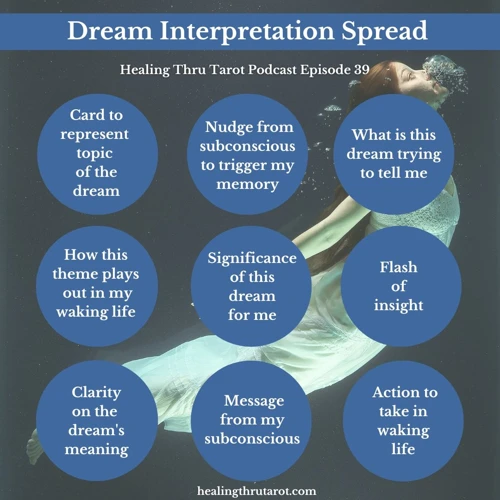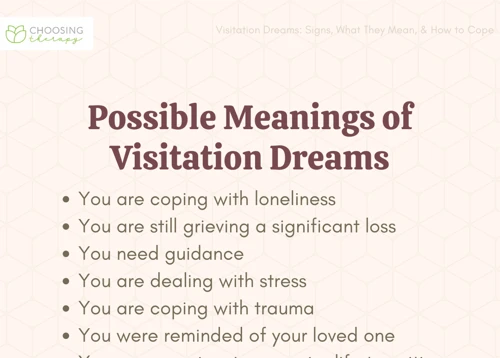Have you ever had a dream about a deceased loved one? If so, you may have wondered about the meaning behind these dreams and what they could be trying to communicate. Dreams of deceased loved ones can evoke a mix of emotions and leave us feeling perplexed and curious. In this article, we will explore the various reasons why we dream of deceased loved ones and how to interpret these dreams. We will also discuss common dream scenarios and provide guidance on coping with these dreams. So, buckle up and get ready to dive into the hidden world of dreams and the messages they may hold from our departed loved ones.
Why Do We Dream of Deceased Loved Ones?

Dreaming of deceased loved ones can serve several purposes, each unique to the individual and their relationship with the departed. One reason is the desire for connection and closure, as dreams can provide a sense of reunion and allow us to say goodbye. Another possibility is that these dreams may carry messages and guidance from the deceased, offering advice or reassurance. Lastly, dreams of deceased loved ones can be a part of the grieving process, aiding in grief and healing by allowing us to process emotions and memories associated with the loss. The complexity and meaning of these dreams can vary greatly, so let’s explore further to better understand them.
1. Connection and Closure
Dreams of deceased loved ones can provide a sense of connection and closure to those who have experienced loss. In these dreams, individuals may feel as though they are reunited with their loved one, allowing them to express unresolved emotions, ask questions, or simply spend time together. These dreams can be comforting and offer a form of healing as they provide an opportunity to say goodbye and find a sense of peace. One possible interpretation of these dreams is that they represent the subconscious mind’s way of processing grief and finding closure. They can also serve as a reminder that the bond with the deceased loved one continues even after their passing. If you’ve had a dream of a deceased loved one, take some time to reflect on the emotions and experiences you had within the dream. It may offer valuable insights into your own healing process.
2. Messages and Guidance
Dreams of deceased loved ones often contain messages and guidance that can provide comfort and direction. These dreams may present themselves as vivid and meaningful encounters, where the deceased person communicates with us through symbols, words, or actions. Paying attention to the details in these dreams can offer valuable insights. For example, a dream of a sick dog could symbolize a need for healing or a reminder to take care of ourselves. Similarly, a dream of a deceased loved one offering guidance or advice can serve as a source of comfort and reassurance. These messages and guidance in dreams can provide us with a sense of support and guidance as we navigate our lives without our loved ones physically present.
3. Grief and Healing
Grief and healing play a significant role in why we dream of deceased loved ones. These dreams can be a way for our subconscious to process the emotions and memories associated with the loss. They provide a space for us to express, confront, and release grief, allowing us to navigate the healing process. Dreams of deceased loved ones may bring a sense of comfort, as they give us the opportunity to reconnect with our loved ones who have passed away. These dreams can also serve as a reminder of the bond we shared, offering solace during difficult times. It’s important to acknowledge and validate these dreams as a natural part of the grieving process.
Common Dreams of Deceased Loved Ones

Dreams of deceased loved ones can manifest in different ways, each carrying its own significance. Here are three common types of dreams that people often experience:
1. Reassurance and Comforting Dreams: These dreams are characterized by a sense of peace and comfort. The deceased loved one may appear healthy and happy, providing reassurance that they are at peace and watching over us.
2. Visitation Dreams: In visitation dreams, the deceased loved one appears to communicate with the dreamer. These dreams often feel vivid and realistic, with clear and meaningful interactions. They can serve as a way for the departed to provide guidance, share messages, or offer closure.
3. Symbolic Dream Encounters: Symbolic dreams involve the use of symbols or metaphors to convey messages or emotions. The deceased loved one may appear in a symbolic form or engage in activities that hold personal significance. Deciphering these symbols is key to understanding the underlying message of the dream.
These are just a few examples, and it’s important to remember that each dream is unique to the individual and their relationship with the departed loved one. Now, let’s move on to exploring how to interpret these dreams and uncover their meanings.
1. Reassurance and Comforting Dreams
When it comes to dreaming of deceased loved ones, one common experience is that of reassurance and comforting dreams. These dreams often bring a sense of peace and solace, providing comfort during times of grief or difficulty. In these dreams, the departed loved one may offer words of encouragement or gestures of affection, helping the dreamer feel supported and loved. While the specific content of these dreams can vary, the underlying theme of reassurance remains constant. It is important to note that these dreams may be influenced by the dreamer’s subconscious longing for comfort, but they can still serve as a source of solace and healing during the mourning process.
2. Visitation Dreams
Visitation dreams, as the name suggests, are dreams where deceased loved ones visit us. These dreams can feel incredibly vivid and real, often leaving a lasting impression. During visitation dreams, the deceased person may appear healthy, happy, and communicate with us through words, gestures or simply through their presence. These dreams can be a source of comfort and reassurance for those grieving, as they provide a sense of continued connection and love from the departed loved one. It is important to approach visitation dreams with an open mind and heart, as they may hold significant meaning and offer solace to those who have lost someone dear.
3. Symbolic Dream Encounters
Symbolic dream encounters are another common type of dream involving deceased loved ones. In these dreams, the deceased may appear in symbolic forms or engage in activities that hold personal significance. These dreams often involve metaphors or symbolic representations that convey deeper meanings. For example, seeing a deceased loved one walking through a beautiful garden may symbolize the idea of peace and tranquility after their passing. It’s important to pay attention to the emotions and atmosphere of these dreams, as they can provide clues to their interpretation. Decoding the symbolism in these encounters can offer insight into unresolved feelings, unresolved issues, or lessons the deceased may want to impart. By exploring the symbols and their personal significance, we can gain a deeper understanding of these meaningful dreams.
Interpreting Dreams of Deceased Loved Ones

When it comes to interpreting dreams of deceased loved ones, it’s important to pay attention to the emotions and atmosphere of the dream. The feelings experienced during the dream can often provide valuable insights into its meaning. Looking for symbolism and patterns within the dream can also offer clues. Symbols such as objects, locations, or even recurring themes might hold significance related to the deceased or their relationship with you. Considering the relationship and context is another crucial aspect of interpretation. Reflect on the nature of your bond and any unresolved issues that may be surfacing through the dream. By analyzing these elements, you can begin to unravel the deeper meaning behind dreams of deceased loved ones.
1. Pay Attention to Emotions and Atmosphere
When it comes to interpreting dreams of deceased loved ones, it’s important to pay close attention to the emotions and atmosphere of the dream. Emotions can provide valuable insights into the meaning behind the dream. Consider the feelings you experienced during the dream, such as joy, sadness, fear, or peace. These emotions can offer clues about the message or purpose of the dream. The atmosphere of the dream, including the setting, lighting, and overall mood, can also contribute to its interpretation. For example, a dream set in a familiar and comforting environment may indicate reassurance or a visitation from a loved one. Conversely, a dream with a dark or unsettling atmosphere may suggest unresolved emotions or unfinished business. By analyzing the emotions and atmosphere of your dream, you can gain a deeper understanding of its significance.
2. Look for Symbolism and Patterns
When interpreting dreams of deceased loved ones, it is important to closely examine the symbolism and patterns within the dream. Pay attention to recurring symbols or themes, as they may hold significant meaning. For example, a dream featuring a clock could symbolize the limited time spent with the loved one or the concept of time running out. Similarly, a dream of flying might represent freedom from earthly burdens. Keep a dream journal to track these symbols and patterns over time, allowing you to uncover deeper insights and connections. Remember, the interpretation of symbols can be highly personal, so trust your intuition and the emotions evoked by these symbols.
3. Consider the Relationship and Context
When interpreting dreams of deceased loved ones, it is important to consider the relationship and context in which the dream takes place. The nature of your connection with the deceased and the circumstances surrounding their passing can greatly influence the meaning of the dream. For example, if you had a complicated relationship or unresolved issues with the deceased, the dream may be an opportunity for revisiting memories or addressing unresolved issues. On the other hand, if you had a close and loving relationship, the dream may be a way for them to express comfort, love, and support from beyond. By considering the nuances of your relationship and the specific context of the dream, you can gain deeper insights into its significance and message.
Interpreting Specific Dream Scenarios

When it comes to interpreting specific dream scenarios involving deceased loved ones, it is important to consider the unique elements of each dream. For instance, talking and communicating with the deceased in a dream can signify the need for closure or the desire to receive a message. Receiving messages or guidance from the deceased could indicate a need for guidance or reassurance during a challenging time. Dreams that involve revisiting memories or unresolved issues with the deceased may point to the need
Subscribe to Our Newsletter
Sign up to receive the latest news and updates.
1. Talking and Communicating with the Deceased
When it comes to dreaming of deceased loved ones, one common scenario is talking and communicating with them in the dream. This type of dream can be incredibly profound and may leave you with a sense of connection or closure. During these dreams, the deceased loved one may speak to you directly, offering guidance, reassurance, or even sharing messages from beyond. Pay attention to the words exchanged and the emotions felt during the conversation, as they can provide valuable insights into the purpose and meaning of the dream. Reflect on any advice or guidance given by the deceased, as it may hold significance for your waking life. Keep in mind that these dream conversations are symbolic and not literal, representing a deeper level of communication with your own subconscious and emotions.
2. Receiving Messages or Guidance
Dreams of deceased loved ones can include scenarios where we receive messages or guidance from them. These dreams often leave a profound impact and can provide valuable insights or advice. The messages can be conveyed through various means, such as verbal communication, symbolic gestures, or intuitive feelings. For example, the deceased might offer words of reassurance, guidance for current life challenges, or even warnings about certain situations. It’s important to pay attention to the details and emotions surrounding these messages, as they can hold significant meaning. Keeping a dream journal can be helpful in identifying patterns and recurring themes in these dreams, allowing us to decipher the messages with greater clarity.
3. Revisiting Memories or Unresolved Issues
Dreams of deceased loved ones may also involve revisiting memories or unresolved issues. These dreams often serve as a reminder of past experiences and relationships, allowing us to reflect on and process these memories. It is common to feel a range of emotions during these dream encounters, from joy and nostalgia to sadness or even conflict. In some cases, these dreams can provide an opportunity to address any unresolved issues or unfinished business with the deceased. Whether it’s a conversation, an apology, or simply a chance to say goodbye, these dream scenarios can offer a sense of closure and emotional healing. It’s important to embrace these dreams with an open mind and heart, as they allow us to reconnect with our loved ones and find resolution in our waking lives.
Coping with Dreams of Deceased Loved Ones
When coping with dreams of deceased loved ones, it can be helpful to seek support and share your experiences with understanding individuals who can offer comfort and guidance. Creating a dream journal can also be beneficial, allowing you to document and reflect on the details of your dreams. Consider discussing your dreams with a therapist or grief counselor who can provide additional insight and help you navigate the complex emotions that may arise. Engaging in self-care activities such as meditation, journaling, or participating in support groups can also aid in coping with these dreams. Remember, everyone’s experience is unique, so find coping strategies that resonate with you and allow yourself to process your emotions at your own pace.
1. Seek Support and Share Your Experiences
Seeking support and sharing your experiences can be immensely helpful when coping with dreams of deceased loved ones. It can be comforting to talk to others who have had similar experiences and can relate to the emotions and complexities involved. Consider reaching out to support groups, online forums, or close friends and family members who are open to discussing dreams and the grieving process. Sharing your experiences not only provides a sense of validation but also allows for a space where you can reflect on the dreams and gain different perspectives. Remember, you don’t have to go through this alone, and seeking support can aid in navigating the profound emotions that these dreams may evoke.
2. Create a Dream Journal and Reflect
Creating a dream journal is a valuable tool for interpreting and reflecting on dreams of deceased loved ones. This journal can be a dedicated notebook or a digital platform where you can record details of your dreams. Start by writing down the date, a brief summary of the dream, and any emotions or sensations experienced. Include specific details, such as the appearance of the deceased and any significant symbols or events. Regularly reviewing your dream journal can help you identify patterns or recurring themes and gain deeper insights into the messages or unresolved issues your dreams may be conveying. Consider using additional prompts or questions to guide your reflection, such as: What feelings did the dream evoke? Are there any connections to your waking life? Could the dream be offering guidance or comfort? By engaging in this reflective process, you can further explore the meaning and significance of your dreams of deceased loved ones.
Conclusion
In conclusion, dreams of deceased loved ones hold a deep significance for many individuals. They can provide a sense of connection, closure, and even offer valuable messages and guidance. The interpretation of these dreams is highly personal and can vary based on emotions, symbolism, and the relationship with the deceased. It is essential to pay attention to the emotions and atmosphere of the dream, look for symbolism and patterns, and consider the relationship and context. Coping with these dreams may involve seeking support, sharing experiences, and creating a dream journal for reflection. Remember, the meaning behind these dreams is subjective, but exploring them can offer comfort and healing in the journey of grief.
Frequently Asked Questions
1. Can dreams of deceased loved ones be considered visitations from the afterlife?
While some people believe that dreams of deceased loved ones are actual visitations from the afterlife, it is ultimately a matter of personal interpretation and belief. Dreams often incorporate elements from our subconscious mind and can be influenced by our emotions and memories of the departed.
2. Are all dreams of deceased loved ones meaningful?
Not all dreams of deceased loved ones have deep or significant meanings. Sometimes, dreams can simply be a reflection of our thoughts and emotions surrounding the loss, rather than a message or visitation from the departed.
3. Why do some people have more dreams of deceased loved ones than others?
The frequency of dreams of deceased loved ones can vary from person to person. Factors such as the depth of the relationship, the intensity of grief, and individual psychological and emotional processes can contribute to the differences in dream experiences.
4. How can I differentiate between a regular dream and a visitation dream?
Differentiating between a regular dream and a visitation dream can be challenging. However, visitation dreams often have a sense of vividness and clarity, and the dreamer may feel a strong connection or presence of the deceased loved one even after waking up.
5. Can dreams of deceased loved ones provide closure?
Dreams of deceased loved ones can sometimes offer a sense of closure by providing the opportunity for the dreamer to express emotions, receive messages, or feel a connection with the departed. However, the level of closure experienced may vary for each individual.
6. What should I do if I have a disturbing dream about a deceased loved one?
If you have a disturbing dream about a deceased loved one, it can be helpful to seek support from a therapist or counselor. They can assist you in processing the emotions and meanings associated with the dream, providing guidance and coping strategies.
7. Can interpreting dreams of deceased loved ones help in the grieving process?
Interpreting dreams of deceased loved ones can be a tool for self-reflection and understanding during the grieving process. It can provide insights into unresolved emotions, memories, and relationships, assisting in the healing journey.
8. Why do dreams of deceased loved ones sometimes feel so real?
Dreams of deceased loved ones can feel exceptionally real due to the emotional significance and powerful connections associated with the individual and their memories of the departed. Dreams have the ability to tap into our subconscious mind and evoke intense emotions and sensations.
9. Can dreams of deceased loved ones bring comfort?
Yes, dreams of deceased loved ones can bring comfort to those who are grieving. These dreams can offer a sense of solace, reassurance, or even a feeling of continued presence, providing a source of emotional support during the mourning process.
10. Should I actively try to induce dreams of deceased loved ones?
Actively trying to induce dreams of deceased loved ones may not be necessary. Dreams occur naturally during the sleep cycle, and the process of grieving and healing will naturally influence the content and frequency of these dreams. It is best to allow the dreams to occur organically.










